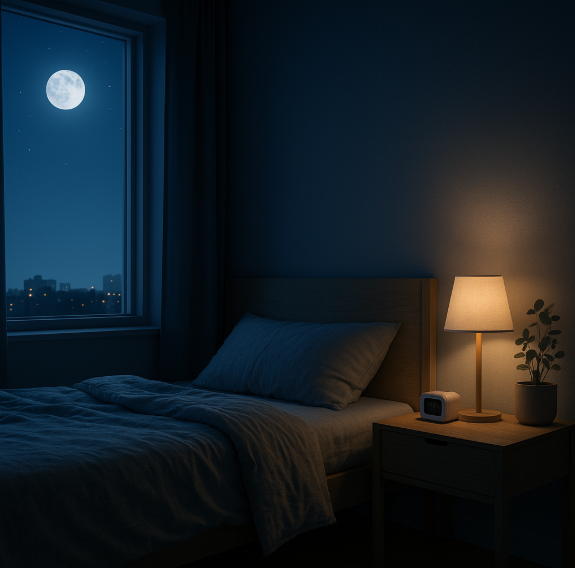Table of Contents
When Sleep Stopped Coming Easily
There was a time when sleep felt effortless. I’d lay down, close my eyes, and drift off without a second thought. But somewhere along the way, that changed. I started lying awake for hours, watching the clock tick, doing the math in my head “If I fall asleep now, I’ll get five hours… okay, four hours… three.” I’d wake up groggy, frustrated, and more anxious about the next night.
The harder I tried to force myself to sleep, the more it slipped away. Friends suggested melatonin or over-the-counter pills, but something in me resisted. I didn’t want to depend on a bottle every night. I wanted to feel rested naturally, the way my body was meant to. That’s when I started paying attention to the little things habits, rituals, and environments I’d been ignoring.
Learning That Sleep Isn’t Just About Nighttime
For the longest time, I thought fixing sleep meant only focusing on what happened at bedtime. But I realized my days were shaping my nights. Caffeine too late in the afternoon, working right up until bed, or scrolling through my phone in the dark were all signals to my body that it wasn’t time to rest.
The first real change I made was simple: I stopped drinking coffee after 2 p.m. At first, it felt unnecessary I told myself caffeine didn’t affect me. But after a week or two, I noticed I was falling asleep faster. That tiny shift opened my eyes. Sleep wasn’t broken; I was just giving my body mixed signals.
Creating a Wind-Down I Could Look Forward To
I used to flop into bed whenever I finished my day sometimes midnight, sometimes later expecting my brain to just switch off. It never did. So I tried something new: creating a small ritual before bed.
Now, about an hour before sleep, I dim the lights and step away from my laptop and phone. I make a cup of chamomile tea, maybe read a few pages of a book, or jot down the thoughts swirling in my head. Some nights I stretch for ten minutes or just sit quietly with music playing softly. It’s nothing fancy, but it tells my mind and body, “We’re winding down.” Over time, my body started responding almost like it knew bedtime was coming and began to relax on its own.
Light: The Invisible Alarm Clock
I didn’t realize how much light controls sleep until I started experimenting. Bright screens at night kept me wired, even if I felt tired. Once I swapped phone scrolling for softer activities, sleep started arriving quicker.
In the mornings, I began stepping outside as soon as I could even just for a few minutes. The natural light helped set my body clock, making it easier to feel awake in the day and tired at night. It’s funny how something as ordinary as sunlight can have such a big effect, but it did.
Food, Drinks, and Timing That Made a Difference
I’ll be honest I was guilty of heavy late dinners and the occasional glass of wine before bed, thinking it would relax me. What I didn’t realize was how much that disrupted my rest. I’d wake up in the middle of the night, restless and uncomfortable.
These days, I eat earlier and keep it lighter if it’s late. If I want a snack before bed, I’ll go for something simple like yogurt or a banana. And instead of wine, I lean on herbal tea. The result? I sleep deeper, and I don’t wake up in the middle of the night nearly as often.
Stress: My Biggest Sleep Thief
Even when I fixed my habits, stress still followed me into bed. I’d lie there replaying conversations or worrying about tomorrow. Some nights it felt like my brain had been waiting all day just to unload the second my head hit the pillow.
What helped was giving myself a way to “empty” my mind. Sometimes I’d journal a quick list of worries or tasks for the next day. Other times, I’d sit in the dark and practice slow breathing, counting in and out until I felt calmer. I also started meditating for five minutes at night not perfectly, but enough to notice when my thoughts ran away and gently bring them back.
It didn’t erase stress, but it gave me a way to stop carrying it into my sleep.
Moving My Body the Right Way
Exercise has always been part of my routine, but I used to work out late at night thinking it would tire me out. Instead, my body would be buzzing with energy, making it harder to sleep.
Now, I try to move earlier in the day. A walk in the morning sun, stretching in the afternoon, or a workout before dinner these keep me active without messing up my sleep rhythm. And on days I move more, I notice I fall asleep faster and stay asleep longer.
Making My Room a Place of Rest
For years, my bedroom was also my office, my hangout space, even my movie spot. No wonder my brain didn’t associate it with rest. So I started reclaiming it as my sleep sanctuary.
I invested in comfortable sheets, kept the room cooler, and even added a small plant and a lavender spray on my pillow. It wasn’t about making it Instagram-worthy it was about making it feel safe and calm. Now, when I step into that room, my body knows: this is where we rest.
The Pressure to Sleep (and Letting It Go)
One of the hardest things to shake was the pressure I put on myself. The more I obsessed over “needing” to sleep, the harder it became. I’d check the clock over and over, panicking about how little time I had left. That anxiety alone was enough to keep me awake.
The night everything shifted, I told myself, “Even if I don’t sleep right away, I’m still resting by lying here.” That small mindset change took off the pressure. If I couldn’t sleep, I’d get up, read a few pages of something light, or sip tea instead of forcing myself to stay in bed frustrated. And surprisingly, sleep usually came sooner once I stopped demanding it.
Choosing Natural Over Pills
There were nights I was tempted to reach for sleeping pills, and while they can help in specific cases, I wanted something more sustainable. What I found instead were gentle, natural habits that let my body find its own rhythm again. It took patience, but it worked.
Now, I fall asleep easier, sleep deeper, and wake up feeling less like I’ve been hit by a truck. It’s not perfect every night life still throws curveballs but it no longer feels like a constant battle.
Final Thoughts: Sleep as an Act of Care
Looking back, I see sleep differently. It’s not just about closing your eyes it’s about the care you give yourself throughout the day. The food you eat, the light you see, the way you move, and the stress you carry all come to bed with you. When you treat those things kindly, your sleep thanks you.
These days, sleep feels less like something I chase and more like something I welcome. It arrives naturally because I’ve created space for it. And honestly, that feels like a small miracle after all the nights I spent struggling.
If you’re where I was tired, frustrated, and tempted to give up please know your body hasn’t forgotten how to sleep. It just needs a little help remembering. Be gentle with yourself, make small changes, and give it time. The rest will come naturally, peacefully, and without pills.



